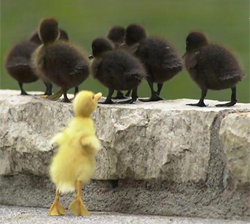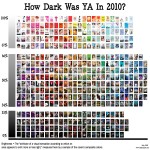Here’s the ugly truth: No writer exists in a void. All writing is influenced by what has come before. There is no such thing as utterly, completely unique because writing exists within a context.
In a world that’s always screaming for the Next New Thing, how do we writers reconcile that with the scary truth that there’s really no such thing as new? Here are a few things I learned as I completed my WIP draft.
1) Write what you love, not what the market “wants.” I used to work in the toy industry and it always boggled my mind that we had to predict what kids would “want” not now but a year from now. We could spend a whole year developing a product only to discover at the end of it all that the trend was over. The same is true for writing. If you’re working on your project because the genre or topic are a big hit now and you want to jump on the bandwagon, chances are you’ll be disappointed. But if you’re working on this book because you love the subject and the characters, then no matter what happens, it’s win-win.
2) Context isn’t something to be afraid of. Think of it as a “safety net.” In the product development world, companies love to create extensions of popular product lines. After all, a good chunk of the development legwork has already been done in the first version, customers recognize the brand and there’s already a built-in market for it.
Think of books that came before yours as a similar “safety net” to your project. Study the books–both the successful ones and the less so–and think about what made them work or not work. Think about what you can do to differentiate your project from what has come before, but still keep it within the context.
3) Find partners in crime. One of my favorite things to do is go to conferences! I love meeting other writers, learning about the craft and hearing new information about the business. This January 2011 I’ll be attending the Writer’s Digest and SCBWI conferences, both in NYC. If you’ve signed up for either of these, let me know in the comments! I love connecting with new writer friends.
The way I see it, you never know who you’ll meet at one of these things. It could be a new critique partner or beta reader, it could be someone you’ll collaborate with some day, it could be a future mentor or someone you might mentor yourself. The key is to be open to possibilities.
4) Ideas are not books. Books are books. In his memoir, Lessons From a Lifetime of Writing, David Morrell talks about the distinction between the idea and execution. Every time I start getting down about how un-unique my ideas are, I reread his chapter on plot where he discusses this subject. His main point is this: sure, an idea might be shiny and new, but an idea does not make a book unique. What makes a book unique is how the writer implements the idea. An example:
Take the Harry Potter series–many people marvel at J.K. Rowling’s originality. “How did she come up with such a unique idea?” they wonder. As if all it takes to create a fantastic book (or series of books) is one extraordinary idea. Because when you have the fun flashy idea then the book just writes itself. Ha!
I don’t know about you, but I find this outlook to be rather belittling to the writer; it’s almost as if the writing doesn’t matter. But as we all know, Harry Potter is about much more than just one sparkly idea. These books are what they are because the author wrote them. That same concept in the hands of any other writer would have turned out to be completely different.
5) Ideas are like subways: any minute now there will be another one. When I worked in toy development, our department had a attitude that boiled down to this: “If a competitor wants to steal our idea, let it. We’ll have an even better one in five minutes anyway.” The minute you think of your idea as one link in a long chain of great ideas, then that one idea doesn’t seem all that ground-breaking anymore. If you coddle and protect your idea like it’s something precious and priceless, you run the risk of getting too attached and taking the project too seriously. Have confidence that another better idea is always just a brainstorm away and that even if someone does “borrow” your concept, they’ll never be able to execute it like you will.
Now go out there and do something wild and crazy and unique!







 Call me Gabi (pronounced gah-BEE). I'm a writer, freelance teacher, and a lover of books and words. I'm also the instigator of DIY MFA. iggi's my sidekick, but he thinks he's the brains behind this operation.
Call me Gabi (pronounced gah-BEE). I'm a writer, freelance teacher, and a lover of books and words. I'm also the instigator of DIY MFA. iggi's my sidekick, but he thinks he's the brains behind this operation.
 Goodbye is for Sissies
Goodbye is for Sissies YA Cafe: What YA Book are You Thankful For?
YA Cafe: What YA Book are You Thankful For? YA Cafe: Why I Love Dark YA
YA Cafe: Why I Love Dark YA YA Cafe: YA Appreciation Month
YA Cafe: YA Appreciation Month
Comments on this post
I'm on it!
21. November - 1:46 amSo true, great post! Good to remember when trying to make novels "stand out from the crowd" for agents and editors. Like you said, I think the execution is the key thing, but a unique twist doesn't hurt, either.
I've never been to the national SCBWI conferences, only the local Oregon ones! I hope you really enjoy it!!!
21. November - 2:34 amGreat tips, thanks 🙂 Loved your analogies to the toy industry!
Rach
21. November - 11:24 amDon't ya just hate it when people come up to you and say 'hey I have great idea for your next book!'
agree with no.4- ideas are just ideas. Having a few or many of them doesn't mean anything unless you act on them
23. November - 6:24 amI'm coming to Writer's Digest Conf in NYC.
10. December - 4:43 amDefinitely would love to meet other writers (and then stalk agents together).